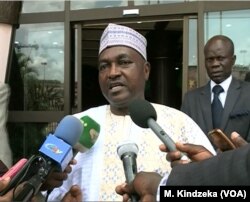Authorities in Cameroon say 165 Anglophone separatists and Boko Haram terrorists have voluntarily surrendered in the past two months, while hundreds of other separatists have stopped fighting.
Cameroon's military and groups loyal to the government have been been circulating a video for the past week of an alleged former separatist fighter named Yannick Kawa.
The video, divided into two parts, first shows Kawa saying he would never stop commanding his fighters to crush the military. However, the second part shows Kawa telling a crowd that a stranger online convinced him to surrender to the military's Rapid Intervention Battalion, the BIR.
"I was in touch with one man online, he started encouraging me," Kawa said in the video. "Then I decided to surrender myself to the BIR. From that day up 'til today, I am free."
Cameroon's National Committee on Disarmament, Demobilization, and Reintegration (NCDDR) said 56 of the militants who surrendered were from Cameroon's two English-speaking regions, while 109 were from Mora on the border with Nigeria.
"The numbers may seem small, but I think we are doing a lot because in addition to these numbers we have, we have hundreds of them who have laid down their arms," NCDDR coordinator Francis Fai Yengo said.
Yengo said many who surrendered were in a location he could not disclose for security reasons.
Some skeptical
Skeptics are raising doubts about the government's evidence.
Josue Medoung of rights group Cameroon Watch says it is difficult to believe that those who surrendered are separatists and terrorists.
He says the rebels and terrorists are equipped with weapons of war, while the arms authorities presented as allegedly turned over by militants were locally made and used by common criminals.
Armed gangs and highway robbers are also stealing, killing, abducting and extorting money from civilians, Medoung said, adding that those who are handing over their weapons may be armed gang members who fear being killed by the military, or even separatist fighters.
Medoung says the intensity of the conflict reported in the English-speaking regions within the past two months shows that fighting is still raging.
'Olive branch of peace'
NCDDR coordinator for Cameroon's Northwest, Sixtus Gabsa, says many militants are still not convinced that the committee wants to help.
"The major problem we have is the problem of confidence building," Gabsa said. "Most of the children in the bushes, even the stake holders, are saying that we are playing tricks to bring the children out and kill them. No. The head of state [president] has given an olive branch of peace. Nothing is going to happen to them."
Cameroon's president, Paul Biya, created the committee last year to manage the disarming and reintegration of militants who surrendered.
Authorities have promised that Anglophone rebels and Boko Haram terrorists who disarm will get professional job training in rehabilitation centers across Cameroon. However, the rehabilitation centers have been slow to take off, as the rebels don't trust authorities and some centers have yet to be built.
Cameroon says at least 1,000 people have died in the three-year separatist conflict, while Boko Haram terrorists have killed more than 1,500 people since its insurgency began nine years ago.





